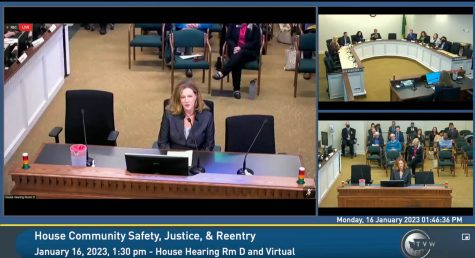Increase in legal penalties for hazing reaches second bid
Bill’s statute increases would make a difference in criminal investigations
COURTESY OF JOLAYNE HOUTZ AND HECTOR MARTINEZ
Sam Martinez died Nov. 12, 2019, after participating in a “Big-Little reveal night” with members of the Alpha Tau Omega fraternity.
February 8, 2023
Every time Jolayne Houtz recounts the story of her son Sam’s death, it breaks her heart all over again.
However, she feels a responsibility to continue to tell it.
“Maybe [Sam’s] story will reach just the right person at just the right moment, and it will prevent another injury or death from hazing. So we keep going,” Houtz said.
Hazing is widespread in America — 55% of students report having an experience of hazing in their post-secondary education career; however, of those individuals, 95% will never report those acts, representative Mari Leavitt for the 28th District said, referring to a study from 2008.
While these events may be largely associated with the Greek Community, in reality, hazing occurs across many groups of students, from athletics to marching band and other student clubs and organizations, she said.
Further, hazing occurs everywhere — it happens in urban and rural areas alike. It happens in community colleges and technical schools. It happens at post-secondary institutions, both public and private, Leavitt said.
Houtz and her husband Hector Martinez advocated for two bills in the legislative session last year: 1751 and 1758. 1751 passed into law in June of 2022. Sam’s Law created clearer guidelines and more transparency around reporting hazing at public institutions, like WSU. Prior to Sam’s Law, Washington’s laws around hazing had not been updated for nearly 30 years.
On Jan. 16, Houtz and Martinez testified to the state legislature again urging them to support House Bill 1002, a similar bill to 1758. The short legislative session last year halted the previous Bill’s progress.
It is currently a misdemeanor for any student or person in attendance at a public or private institution of higher education to participate in or conspire to engage in hazing, according to the current law. If passed, House Bill 1002 would reclassify hazing from a misdemeanor to a gross misdemeanor; however, if hazing is severe enough to cause substantial bodily harm, as defined by Revised Code of Washington (RCW) 9A.42.010, it is reclassified as a Class C felony.

Jolayne Houtz testifying to the House Community Safety, Justice, & Reentry committee on Jan. 16
These reclassifications would equip law enforcement with more tools to investigate hazing incidents, such as the ability to conduct more thorough investigations. A gross misdemeanor provides a two-year statute of limitations. This would be an increase from the current one-year statute that accompanies a misdemeanor. Additionally, if the severity of the hazing raised the crime to a felony, the statute would be three years to investigate and begin prosecution.
Both Whitman County Prosecutor Denis Tracy and WSU Chief of Police Gary Jenkins agreed in their testimony that the two-year statute would have made a difference in Sam Martinez’s case.
Jenkins said complex digital forensics took the Pullman Police Department’s investigation beyond a year, exceeding the statute of limitation for a misdemeanor. If hazing had instead been a gross misdemeanor at the time, they would have been able to complete the investigation within the statute.
“Our experience with the criminal justice system following Sam’s death has only added to our pain. Hazing is currently a misdemeanor in Washington — that’s equivalent to shoplifting,” Houtz said.
Houtz thinks that Bill 1002 is a key part to the state of Washington committing to take hazing seriously and have meaningful penalties.
“The hardest thing that happened to me in my life is losing my child,” Martinez said.
Another difficult day for Martinez was the day the people responsible for hazing Sam were sentenced. Martinez said that while he forgives them, he thought that the penalties they had for what they did were ridiculous.
In Sam Martinez’s case, many of the fifteen people charged in connection with his death served only one day in jail and some community service, Houtz said.
Sam’s “big brother” who told him to “drink the family drink” of a half-gallon bottle of rum served only 19 days in jail, she said.
“That is not a serious signal to send to anyone about hazing. It’s laughable. It’s painful, and it’s offensive,” Houtz said. “There were no meaningful consequences for Sam’s death.”
Currently, furnishing liquor to a minor has a higher criminal penalty than hazing. Even when hazing results in death, the maximum punishment is limited to 90 days in jail or a $1000 fine, Jenkins said.
If Bill 1002 passes, it would additionally include hazing as a crime of harassment — this classification would allow courts to enter criminally enforceable no-contact orders, providing important protection from retribution against the victims of hazing incidents, Houtz said.
1002 would also provide a potential for national organizations to be charged in connection to hazing in addition to holding the individual members accountable. If found criminally responsible, there are substantial fines and penalties that can be imposed on a corporation that has an official or unofficial policy of encouraging hazing, Tracy said.
In the more than three years since Sam’s death, little has changed within WSU’s Greek system, according to Charlie Gartenberg.
Gartenberg met Sam in tenth grade and the two had been best friends ever since, he said.
While they were freshmen at WSU, the two would get lunch together and update each other on what was happening in their lives. Since they were both pledging fraternities at the time, most of their conversations consisted of “hazing stories.”
In his testimony, Gartenberg said Sam talked about being forced to eat raw onions whole and having to do wall sits and other physical activities at the heed of the “pledge master.” Sam was also yelled at and forced to drink large amounts of alcohol as part of his initiation process.
“At the time, it seemed like fun and games, but we were oblivious that it was more like a life or death situation,” Gartenberg said.
Later, Gartenberg joined WSU’s Interfraternity Council as the Director of Recruitment to try and better the community. In that position, he heard multiple stories of hazing incidents occurring in a single week, and even in a single day, he said.
The Greek Standards Board, an organization charged with “maintaining the behavioral standards,” according to their website, would give fraternities a “slap on the wrist,” which usually included no partying for a few weeks, Gartenberg said.
Often, many of these incidents are reported without punishment, he said.
During Gartenberg’s testimony, Chair Roger Goodman of the House Community Safety, Justice, & Reentry committee asked Gartendberg if he had seen any changes in the Greek community since Sam’s death.
Gartenberg said when it comes to hazing, every fraternity does it.
“They try to be as secretive as they can about it. People don’t change,” he said.
The passing of Bill 1002 could change the culture, Gartenberg said.
“There are so many good actors in the Greek system. There are fraternities and sororities that do exactly what they allege they are going to do … but the bad actors in the system give all of them a terrible reputation,” Houtz said.
Education continues to be another essential component of fighting hazing for Houtz. She wants incoming students and their families to learn more about the organizations they are looking to join.
Sam’s family is currently working with the University of Washington Information School to put together a nationwide hazing database that would track hazing deaths nationally, as well as investigations and injuries.
“I think that’s ultimately what’s missing in the equation. [Parents and students] don’t have access to good information. So our family feels filling that void is really important and will complement the legislation nicely,” Houtz said.
The chapter status of student organizations at WSU can be viewed here.
“Fraternities and universities are simply unable or unwilling to end hazing by themselves. We have to do it for them. They need external forces to put pressure on them to say we just simply won’t stand for hazing anymore,” Houtz said.
Houtz said their family paid the ultimate price for WSU and Alpha Tau Omega’s inattention and inability to end hazing — they paid with their son’s life.
“Nobody else anywhere should have to go through that again, so that’s what keeps us going,” Houtz said.
On Jan. 26, the House Committee on Community Safety, Justice, & Reentry took action to move Bill 1002 out of committee and referred it to the Rules Committee. The Rules committee will select the bills that will move on to the House floor for a full vote—the next step in the process of becoming law.
To support House Bill 1002, comments can be made on the bill here. These comments follow the bill, allowing legislators to track how much public backing it has. Additionally, members of the House Rules Committee can be contacted to show support for the bill, Houtz said.
“Any kind of outreach that people can do will be part of the momentum that we are going to build around this bill,” Houtz said.
Houtz is hopeful that this is the moment to get hazing criminal penalty reforms into place. She does not take anything for granted, knowing that they are going to have to work hard every day to mobilize the community.
“We’re here to see it through to the end,” Houtz said.
















